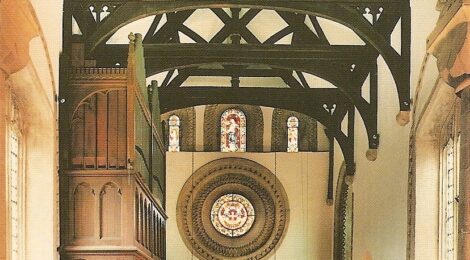
SERMON: What is a saint?
Preached by David Barton on Wednesday 11th August 2021.
We have a double saints day today: St Clare of Assisi and our local saint, John Henry Newman. So I thought I’d say something briefly about Saints. What is a saint? Why do we have them? How do we define a saint?
In a way St Clare is rather a good person to think about in connection with saints because, remarkable woman thought she undoubtedly was, she didn’t do anything particularly startling in life. Once she declared her desire to follow Francis she was “enclosed” in a convent. She was certainly a powerful woman of prayer whose prayerful influence spread far beyond her convent walls. But there is a kind of anonymity about Clare, which makes her a good person to ask this question about: what is a saint?
There are a lot of possible guesses I suppose. But I think I’d want to say that a saint is a person who is loved by God. I can’t actually see that there is any other definition than that that really works. A saint is someone who is loved by God and who simply goes on to let that love work in them and shape them. That can lead to all sorts of things – miracles and so on. But what matters here is God’s love. On that definition the first saint is Jesus, whose life was lived entirely in response to God. Jesus was someone through whom the love of God flowed visibly – all though his life but particularly on the cross, when he becomes almost transparent to God.
We might say that Jesus is the first saint – in the sense that all other saints have received their godliness from him. That is what the Fourth Gospel means when it says “From his fullness we have all received, grace upon grace.” Your Grace and my grace and the grace of the saints is all the same – and it comes from Christ’s grace. We are loved by God because Christ is loved by God. Holiness is a matter of being loved. And the Christian life is about learning to “abide” in that love. “Abiding”: that often repeated word of the fourth Gospel. I suppose you could say that the people we choose to call saints are those who have been particularly conspicuous in their abiding in God’s love.
And I think Clare and Francis and all those early Franciscan saints, have a particular and important quality about sanctity that doesn’t often get mentioned: that of a completely unselfconscious devotion to God. And its that word unselfconscious that matters here. Francis, learning to see Christ in everyone around him, saw the leper – who he was suppose to avoid – saw Christ in him and simply embraced him. No gap between perception and action.
The same when his Father had him up before the Bishop of Assisi, in front of the whole town, accusing him of theft in an effort to stop this headlong rush into the depth of the Christian faith. For Francis this is the moment of decision, the moment to cut himself off from his family, and throw himself on the mercy of the church. So he simply takes his clothes off as a sign of it. Its an utterly unselfconscious action. And he is wrapped up by the Bishop – who was probably very self conscious at that particular moment! And the same with Clare: she deeply loved Francis. And if that love meant going into enclosure for the rest of her life, then, so be it. There was no calculation about that. No ifs, no buts. There was no other choice because of what she inwardly knew and felt.
And it seems to me that is a really important quality about living the Christian life. We often think too much about what we should and shouldn’t do as Christians. But the love of God goes deep into us. Deep into our hearts we say, which mean far deeper than our brains. God’s love shapes the deepest part of our lives. The Christian life is about learning to trust that.
When Jesus says “Let your Yes be Yes and your No be No,’ that’s what he means. Speak clearly from the depth of yourself.
And he tells his disciples: “Don’t think about what to say. I’ll tell you what to say”. Admittedly the example he gives is the tough one – when your hauled in front of the Sanhedrin. But Jesus always does that: the strong example, but everything along the way is exactly same. God will show us what to do and to say.
Its about coming back to the original life that God intended for us as human beings, lived in instinctive response to the world of which we are part, and to God who made us. And if that seems risky, then so be it. Part of the way we learn to trust God and Christ is about that. The lives of those we call saints are often very good at showing us that.
So……saints give us much to ponder.





